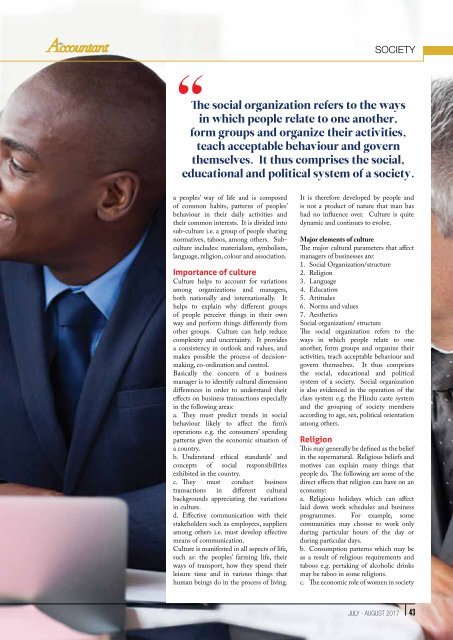The-Accountant-Jul-Aug-2017
You also want an ePaper? Increase the reach of your titles
YUMPU automatically turns print PDFs into web optimized ePapers that Google loves.
SOCIETY<br />
<strong>The</strong> social organization refers to the ways<br />
in which people relate to one another,<br />
form groups and organize their activities,<br />
teach acceptable behaviour and govern<br />
themselves. It thus comprises the social,<br />
educational and political system of a society.<br />
a peoples’ way of life and is composed<br />
of common habits, patterns of peoples’<br />
behaviour in their daily activities and<br />
their common interests. It is divided into<br />
sub-culture i.e. a group of people sharing<br />
normatives, taboos, among others. Subculture<br />
includes: materialism, symbolism,<br />
language, religion, colour and association.<br />
Importance of culture<br />
Culture helps to account for variations<br />
among organizations and managers,<br />
both nationally and internationally. It<br />
helps to explain why different groups<br />
of people perceive things in their own<br />
way and perform things differently from<br />
other groups. Culture can help reduce<br />
complexity and uncertainty. It provides<br />
a consistency in outlook and values, and<br />
makes possible the process of decisionmaking,<br />
co-ordination and control.<br />
Basically the concern of a business<br />
manager is to identify cultural dimension<br />
differences in order to understand their<br />
effects on business transactions especially<br />
in the following areas:<br />
a. <strong>The</strong>y must predict trends in social<br />
behaviour likely to affect the firm’s<br />
operations e.g. the consumers’ spending<br />
patterns given the economic situation of<br />
a country.<br />
b. Understand ethical standards’ and<br />
concepts of social responsibilities<br />
exhibited in the country.<br />
c. <strong>The</strong>y must conduct business<br />
transactions in different cultural<br />
backgrounds appreciating the variations<br />
in culture.<br />
d. Effective communication with their<br />
stakeholders such as employees, suppliers<br />
among others i.e. must develop effective<br />
means of communication.<br />
Culture is manifested in all aspects of life,<br />
such as: the peoples’ farming life, their<br />
ways of transport, how they spend their<br />
leisure time and in various things that<br />
human beings do in the process of living.<br />
It is therefore developed by people and<br />
is not a product of nature that man has<br />
had no influence over. Culture is quite<br />
dynamic and continues to evolve.<br />
Major elements of culture<br />
<strong>The</strong> major cultural parameters that affect<br />
managers of businesses are:<br />
1. Social Organization/structure<br />
2. Religion<br />
3. Language<br />
4. Education<br />
5. Attitudes<br />
6. Norms and values<br />
7. Aesthetics<br />
Social organization/ structure<br />
<strong>The</strong> social organization refers to the<br />
ways in which people relate to one<br />
another, form groups and organize their<br />
activities, teach acceptable behaviour and<br />
govern themselves. It thus comprises<br />
the social, educational and political<br />
system of a society. Social organization<br />
is also evidenced in the operation of the<br />
class system e.g. the Hindu caste system<br />
and the grouping of society members<br />
according to age, sex, political orientation<br />
among others.<br />
Religion<br />
This may generally be defined as the belief<br />
in the supernatural. Religious beliefs and<br />
motives can explain many things that<br />
people do. <strong>The</strong> following are some of the<br />
direct effects that religion can have on an<br />
economy:<br />
a. Religious holidays which can affect<br />
laid down work schedules and business<br />
programmes. For example, some<br />
communities may choose to work only<br />
during particular hours of the day or<br />
during particular days.<br />
b. Consumption patterns which may be<br />
as a result of religious requirements and<br />
taboos e.g. pertaking of alcoholic drinks<br />
may be taboo in some religions.<br />
c. <strong>The</strong> economic role of women in society<br />
JULY - AUGUST <strong>2017</strong> 43

















